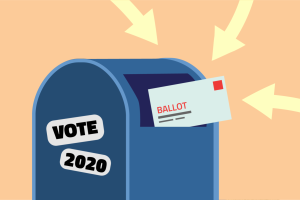Mail-in Ballots Delay the Electoral Process, Encourage Voter Fraud, and Make a Political Statement
November 1, 2020
“The Port Press is a publication authorized by the Northport – East Northport Union Free School District. The articles and opinions stated in The Port Press are solely the opinions of the individual writer, and do not necessarily reflect the opinions of the Northport – East Northport Union Free School District, Northport High School or any individual affiliated with such entities.”
The 2020 Presidential election is just two days away. On November 3, after a long and intense political battle between two diametrically-opposed candidates, the next President of the United States will be announced.
…Right?
With the exception of a small handful of presidential elections (most notably the 2000 election between former Vice President Al Gore and Texas Governor George W. Bush), Americans generally know the winner of the election — their next president — on Election Night. Granted, electoral votes are not officially counted until January 6 (or another date, if changed by law), but it is rare for electors to cast their vote contrary to the will of their state. This year, however, with an extraordinary number of mail-in ballots cast due to concerns over COVID-19 and a potential lack of social distancing at in-person voting sites, it will likely take days or weeks after Election Day to tally all the votes.
Delayed election results are the least of America’s concerns. Mail-in ballots have consistently been shown to be rife with fraud and security issues. In September, nine military ballots were found discarded in Pennsylvania. The contents of two of the ballots could not be determined, but the other seven were all cast for Trump. Officials in Miami-Dade County, Florida, shared “concerned” postal worker’s video of piles of unsorted mail in a post office. The worker claimed that among these piles there were ballots that were accounted for. In Virginia, at least 1,400 voters received duplicate ballots. While election officials across the country have been quick to assure people that a person’s vote will only count once — even if a single voter sends in multiple ballots — it may not be safe to assume that duplicate votes will not occur.
The sudden increase in mail-in ballot usage can be attributed to fears that in-person voting may facilitate the spread of COVID-19. Though this is a valid concern, polling places already keep voters distanced from each other in order to ensure that everyone can cast their votes in privacy. Even more, the same safety measures implemented in grocery stores, doctor’s offices, and workplaces — including mask and social distancing mandates — will be enforced at polling places.
It’s likely that many Americans are voting by mail to make a political statement — not because they have any actual health concerns. This behavior is prevalent among Democratic voters, who may wish to conform to party standards that strongly support mail-in voting.
In the end, Americans risk exercising their right to vote through a fraudulent and insecure system. If people feel comfortable leaving their house to buy a bag of potato chips, they should feel comfortable voting in person in what is quite possibly modern America’s most important election.

